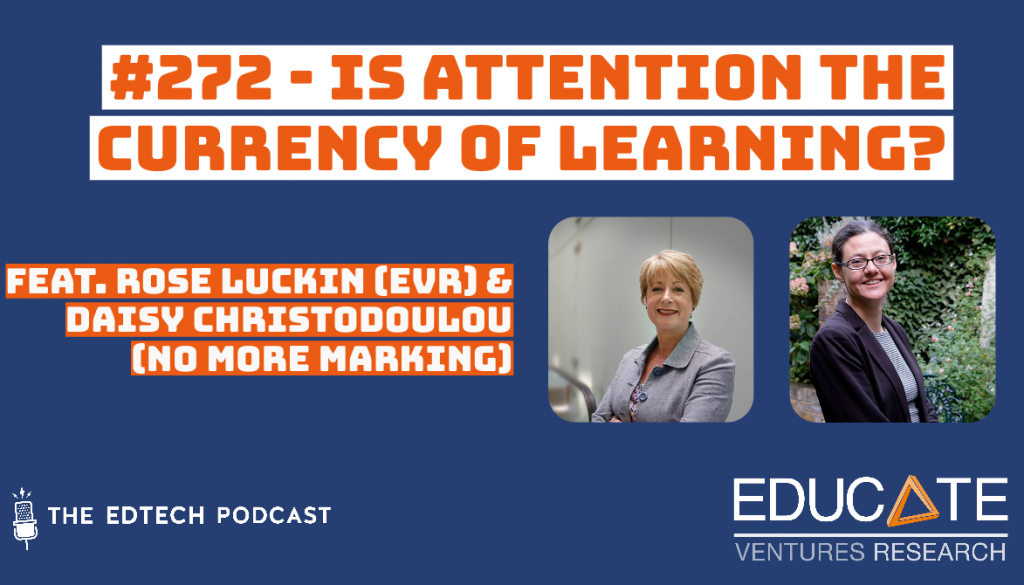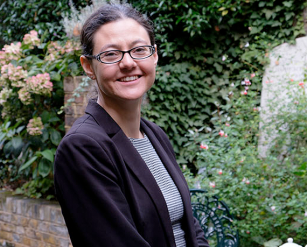#272 – Is Attention the Currency of Learning?

Subscribe on iTunes, Spotify, Stitcher, TuneIn, Google Podcasts, Amazon Music
What’s in this episode?
Rose hosts Daisy Christodoulou, Director of Education at No More Marking in the EdTech Podcast Zoom studio this week, discussing AI regulation, evidence and effectiveness, and student outcomes in AI assessment, and what we think the future of AI-powered education might look like, and why!
In late March of this year, Professor Rose Luckin and Daisy Christodoulou spoke at the UK parliament’s Governance of Artificial Intelligence oral evidence session for education, and the discussion that took place was passionate and exciting. A link to the video of the session is below in the Show Notes if you’d like to watch it yourself, but a lot of ground was covered, yet not as much as they wished!
The interest in AI and its governance is very intense at the moment. The UK government had published a white paper setting out their proposed approach to the governance of AI and the indication from the paper was that rather than give responsibility for AI governance to a single new AI regulator, it intended to empower existing regulators, and that there were several that existed in the education sector already. Other points raised during the session included the idea of teaching a degree of scepticism in the public’s understanding of AI, meaning that the public should not believe everything that something like ChatGPT, a large language model, returns, for instance, when queried. Concerns about the speed of AI development were raised, there were questions on safeguarding, ethics, transparency, explainability, access to the technology, autonomy, adaptivity and more.
In today’s episode, we’d like to revisit those thoughts on AI regulation, evidence and effectiveness, student outcomes in AI assessment, and what we think the future of AI-powered education might look like and why…
Talking points and questions include:
- Quality of evidence for improved student outcomes using AI
- The value of assessment: how, when, why, and in what form
- More discussion around the future of education with AI’s inclusion, and what we can do now
Material discussed in today’s episode includes:
- Science and Technology Committee Oral evidence: Governance of artificial intelligence – PDF transcript as well as link to the video on the first page
- Daisy Christodoulou Books
- Mindspark Research Impact
- The Skinny on AI for Education, EVR’s newest publication featuring insights, trends and developments in the world of AI Ed
Guests
Daisy Christodoulou – Director of Education, No More Marking

Daisy is the Director of Education at No More Marking, a provider of online Comparative Judgement software for schools. Before joining No More Marking, Daisy was Head of Assessment at Ark Schools, a group of academy schools in the UK, and before that, she was a secondary English teacher in London. Daisy has written three books about education: Seven Myths about Education, Making Good Progress, and Teachers vs Tech. You can find out more about them here.
Host
Rose Luckin – Professor of Learner Centred Design, UCL, Founder, EDUCATE Ventures Research

Rosemary (Rose) Luckin is Professor of Learner Centred Design at UCL Knowledge Lab. She was named one of the 20 most influential people in education in the Seldon List, 2017. Rose is Founder of EDUCATE Ventures Research Ltd., a London hub for start-ups, researchers and educators developing evidence-based educational technology. She is past president and current treasurer of the International Society for AI in Education and co-founder of the Institute for Ethical AI in Education.
We would love to hear from you
- Post your thoughts or follow-on links via Twitter @podcastedtech or via The Edtech Podcast Facebook page or Instagram
Rate and Review
- Drop us a rate or review or share this episode. By doing so, you help other new listeners find our material. Thank you and happy listening!
Tell us where you are listening in from
We’d love to hear your thoughts. Record a quick free voicemail via speakpipe for inclusion in the next episode. Or you can post your thoughts or follow-on links via twitter @podcastedtech or via The Edtech Podcast LinkedIn page or Instagram.



